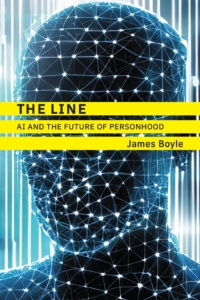Humans are no longer the only entities capable of generating language and ideas with fluency. But this advancement raises a profound question: are artificial intelligence systems truly conscious, or are they simply performing an elaborate imitation of human thought? And if, in the future, claims of AI consciousness become more credible, how will that shift our understanding of these technologies? Will we continue to see them as tools, or begin to recognize them as something closer to persons? In his book “The Line: AI and the Future of Personhood”, Professor James Boyle confronts these complex issues. He explores how questions that once belonged to the realm of science fiction have now become urgent and real. He examines how this technological shift might redefine our understanding of personhood and challenge the boundary—”the line”—that separates humans from everything else, as well as persons with legal rights from inanimate objects. In this episode of Bridging the Gaps, I speak with Professor James Boyle to explore these timely, thought provoking and transformative questions.
James Boyle is a professor of Law at Duke Law School, founder of the Center for the Study of the Public Domain, and former Chair of Creative Commons. He is the winner of the Electronic Frontier Foundation’s Pioneer Award for his work on digital civil liberties.
We begin by talking about the idea of personhood—what it means, how we define it, and what separates beings that have personhood from those that don’t. I ask whether it’s simply consciousness that makes the difference. We then explore why empathy is an important part of thinking about personhood.
Next, we discuss the challenge of using consciousness as a dividing line. If consciousness is what separates those with personhood from those without, how can we use such a complex and unclear concept to draw that line?
In his book, The Line: AI and the Future of Personhood, James Boyle uses many examples from science fiction to explore these tough questions. I found this approach fascinating, and I asked him why he chose science fiction as a way to talk about such deep and complicated ideas.
We also talk about similar issues that came up when thinking about the rights of corporations and other non-living things. Then we move on to what we can learn from how rights have been developed for non-human animals. Finally, we touch on recent court cases involving decisions made by artificial intelligence.
Overall, this was a very engaging and insightful conversation.
Complement this discussion with “Evolutionary Intelligence: How Technology Will Make Us Smarter” with Professor W. Russell Neuman and the listen to Reclaiming Human Intelligence and “How to Stay Smart in a Smart World” with Prof. Gerd Gigerenzer







Connect With Us